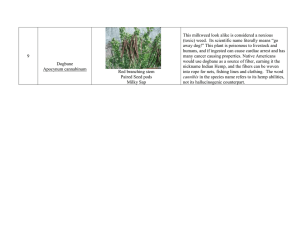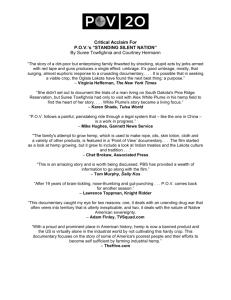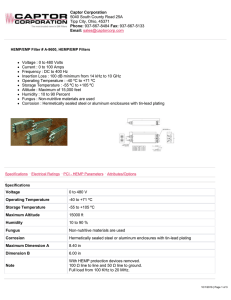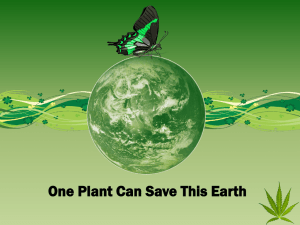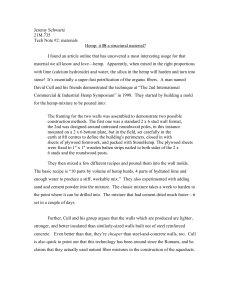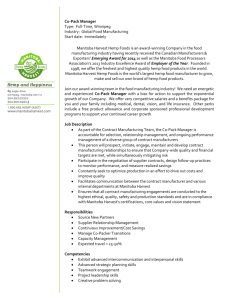Hemp Australia Pty Ltd - Parliament of Tasmania
advertisement
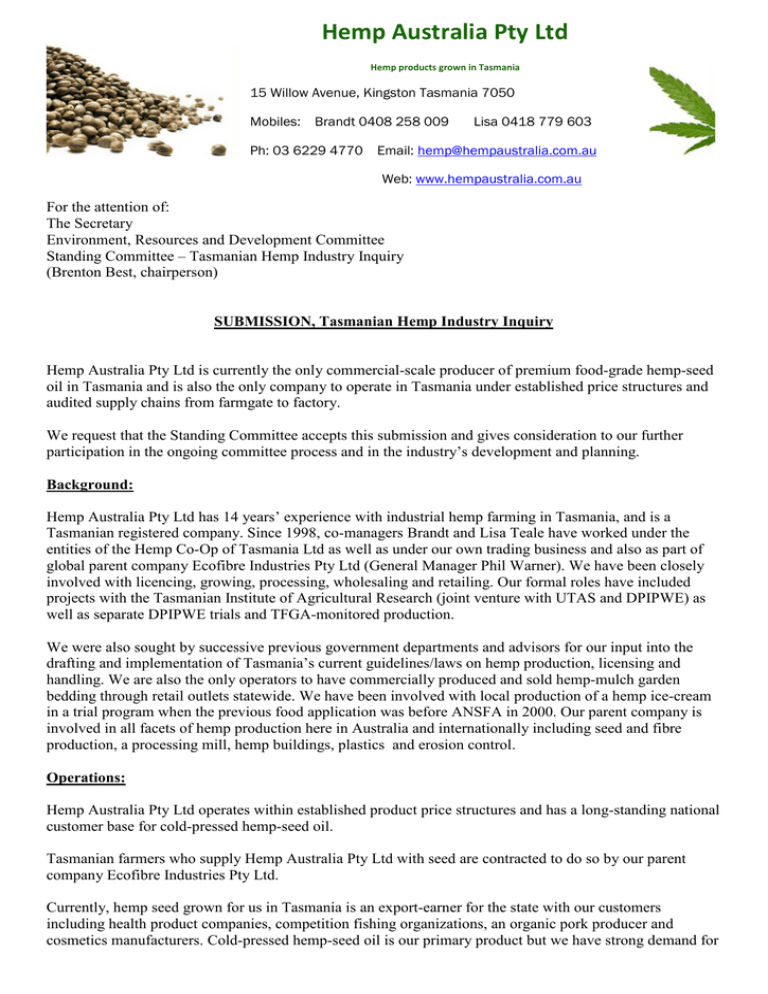
Hemp Australia Pty Ltd Hemp products grown in Tasmania 15 Willow Avenue, Kingston Tasmania 7050 Mobiles: Brandt 0408 258 009 Ph: 03 6229 4770 Lisa 0418 779 603 Email: hemp@hempaustralia.com.au Web: www.hempaustralia.com.au For the attention of: The Secretary Environment, Resources and Development Committee Standing Committee – Tasmanian Hemp Industry Inquiry (Brenton Best, chairperson) SUBMISSION, Tasmanian Hemp Industry Inquiry Hemp Australia Pty Ltd is currently the only commercial-scale producer of premium food-grade hemp-seed oil in Tasmania and is also the only company to operate in Tasmania under established price structures and audited supply chains from farmgate to factory. We request that the Standing Committee accepts this submission and gives consideration to our further participation in the ongoing committee process and in the industry’s development and planning. Background: Hemp Australia Pty Ltd has 14 years’ experience with industrial hemp farming in Tasmania, and is a Tasmanian registered company. Since 1998, co-managers Brandt and Lisa Teale have worked under the entities of the Hemp Co-Op of Tasmania Ltd as well as under our own trading business and also as part of global parent company Ecofibre Industries Pty Ltd (General Manager Phil Warner). We have been closely involved with licencing, growing, processing, wholesaling and retailing. Our formal roles have included projects with the Tasmanian Institute of Agricultural Research (joint venture with UTAS and DPIPWE) as well as separate DPIPWE trials and TFGA-monitored production. We were also sought by successive previous government departments and advisors for our input into the drafting and implementation of Tasmania’s current guidelines/laws on hemp production, licensing and handling. We are also the only operators to have commercially produced and sold hemp-mulch garden bedding through retail outlets statewide. We have been involved with local production of a hemp ice-cream in a trial program when the previous food application was before ANSFA in 2000. Our parent company is involved in all facets of hemp production here in Australia and internationally including seed and fibre production, a processing mill, hemp buildings, plastics and erosion control. Operations: Hemp Australia Pty Ltd operates within established product price structures and has a long-standing national customer base for cold-pressed hemp-seed oil. Tasmanian farmers who supply Hemp Australia Pty Ltd with seed are contracted to do so by our parent company Ecofibre Industries Pty Ltd. Currently, hemp seed grown for us in Tasmania is an export-earner for the state with our customers including health product companies, competition fishing organizations, an organic pork producer and cosmetics manufacturers. Cold-pressed hemp-seed oil is our primary product but we have strong demand for byproducts including hemp meal (the flakey leftovers from pressing), which is ground into a high-protein flour. Our oil is labeled according to the current federal laws, ie, that it is a food-grade oil but that it is illegal to consume it in Australia. Despite the labeling indicating the legal constraints, we believe the majority of consumers buy the oil for consumption. Our production volumes, supply arrangements and price structures are strictly confidential. Considerations for the Standing Committee: Hemp Australia Pty Ltd is preparing for rapid, exponential growth in demand if the present review by FSANZ Application A1039 approves hemp-seed products for human consumption. A minimum immediate expectation would be for a short-term 20-fold increase in demand for Tasmanian production, though it would not be unrealistic to expect even greater demand. Long-term demand under approved food laws would require much greater volumes of production. Based on past demand, the initial requirement would take annual seed exports from the current dozens of tonnes to many hundreds of tonnes and beyond. This certainly sits well with Tasmania’s vision of one day being the nation’s food bowl. Nationally, laws governing the growing, harvesting, handling and processing of industrial hemp are fragmented and inconsistent from state to state. This needs to be addressed particularly to reduce confusions when transporting product interstate. In its submission to FSANZ, Tasmania Police said its main concern was the risk of misleading drug tests on drivers who had consumed hemp food items prior to mouth-swab saliva sampling. Hemp Australia Pty Ltd is aware that police forces in developed nations in which hemp food is consumed have dealt with this issue and there are no known problems with false readings in drug tests in these jurisdictions. Two studies by Oxford University, in 2001 and 2008, assessed the extended ingestion of 79 Canadian-made hemp food items over four successive 10-day periods. The ingested hemp was equivalent to daily intakes of 125ml of pure hemp-seed oil and though it was an exceptionally high intake, none of the test subjects screened positive to THC when the test cutoff limit was 50 ng/ml. The Oxford Journal of Analytical Toxicology and the Oxford Journal of Chromatography reported: “The highest THC level found in any of the specimens was 5.2 ng/ml, well below the 15 ng/ml confirmation cutoff used in (US) federal drug-testing programs.” The university study used hemp consumption rates and cannabis detection rates that were much more rigorous than those of the actual road rules, meaning the chances of drivers testing positive to cannabis under British law after consuming hemp food was not just unlikely, it was not possible. In the United States in 2003, the Federal Workplace Drug-Testing Program raised the test screening concentration cutoff for opiates (heroin, morphine and codeine) in urine from 300 ng/ml to 2000 ng/ml because the ingestion of poppy seeds in bread was found to be causing positive test results for morphine. The significant increase in the opiate test limit overcame the detection dilemma without altering the public health risk. There were no reported false readings regarding ingested hemp foods. REQUIRED ACTION: Tasmanian authorities need to identify the equipment, detection limits and equipment calibrations used overseas to detect drug-drivers in jurisdictions that have hemp-based food, and to assess the suitability of current equipment used by the state’s authorities. Licensing: Hemp Australia Pty Ltd supports a limited licensing regime for industrial hemp and recommends a major broadening of exemptions. Under present auditing and operating requirements, licences (and associated police checks) are required by the farmer, the carrier to the cleaner, the seed cleaner, the seed storer, the carrier to the downstream processor, the end-product producer, and the seed-waste disposal carrier. That’s seven licences and many police checks (with their associated costs) just for one audited trail. We are concerned that the unnecessary multi-licence situation that currently exists does not present professionally to our existing and prospective customer base, which is intended to include national and multi-national food companies. REQUIRED ACTION: We advise the committee that a rational licensing regime is one in which the owner of the seed is the sole licence holder, with all handling, transport and storage deemed to be under the auspices and direction of the licence holder, and that the requirement for licensing ends when the seed is deemed to be rendered unviable (usually in the production process). At the cropping phase, the grower can be deemed to be the owner of a crop in the field. Licensing changes hands when the product is sold off-farm. In the above-mentioned audit trail, this recommendation would reduce the requirement for seven licenses to just two. THC testing: Cost of infield THC testing is at present around $600 (according to DPIPWE Legislative control document Feb 2012), although as Ecofibre Industries has contracted the growers they have been able to get a lower rate due to multiple testing requests. We believe that at present these tests are sent to Western Australia. REQUIRED ACTION: There is need to identify a facility in Tasmania that can provide a costeffective THC test to enable testing of fresh samples, rather than specimens having to travel across the country. Also the $600 fee seems exorbitant for a crop which has been grown from an already certified low-THC seed. Cost/waste recovery: For several years, Hemp Australia Pty Ltd has sold purpose-grown hemp-stalk garden mulch through Tasmania’s Mitre 10 and Beck’s garden centres. We are proud to have replaced an imported product with a Tasmanian grown, processed and packaged product. This submission seeks that Tasmanian laws be brought into line with best practice interstate and with a view to eventual uniform national legislation. It is advantageous that Tasmania has an alkaloid industry, with poppy crop guidelines able to be partly adopted for growing industrial hemp. REQUIRED ACTION: At present, opium can legally be grown in paddocks beside public roads and highways, and even on school farms as both an income-earner and an educational tool. Industrial hemp (a non-drug crop) is NOT allowed to be grown within sight of a public road and NOT within five (5) kilometers of any school. These factors are restricting the development of a Tasmanian hemp industry. Hemp Australia has had to refuse approaches by farmers on the basis that the cropping paddock is within sight of a road. Also, the Scottsdale High School, which regularly grows opium poppies on its farm, is seeking to grow hemp but is not allowed to. Mulch production has the added benefit of utilising what would otherwise be a waste product, ie, the stubble from a harvested seed crop, giving extra income to the grower. However, because hemp seed is a controlled substance, we have self-imposed a ban on using stubble from a seed crop in case there is the chance of the mulch being contaminated by seed. This greatly limits the full utilization of a hemp seed crop. REQUIRED ACTION: Ongoing dialogue with industry participants to identify options that encourage stubble from harvested seed crops to be used as garden mulch. In conclusion: Though Hemp Australia Pty Ltd is protective of its commercial in-confidence dealings with its customers, we ask the committee to draw on our extensive Tasmanian experience and to consider our involvement in the drafting of future legislative frameworks for a Tasmanian industrial hemp industry. Thank you for the opportunity to comment. Yours sincerely Brandt & Lisa Teale 24/4/2012
